Corn and keto don’t work well together. Whether it is categorized as a grain or a starchy vegetable, you’ll find corn in the “Do Not Eat” category of any keto diet food list. This is because each cup of corn is packed with over 35 grams of net carbs. That is enough to keep most of us from ketosis!
That said, there is a simple trick we can use to convert ketosis-disrupting corn into a satisfying keto-friendly serving of popcorn: Add heat.
If you are looking to indulge in this popular high-carb snack and stay on keto, we’ve included several tips, suggestions, and alternatives below.
What is Popcorn Exactly?
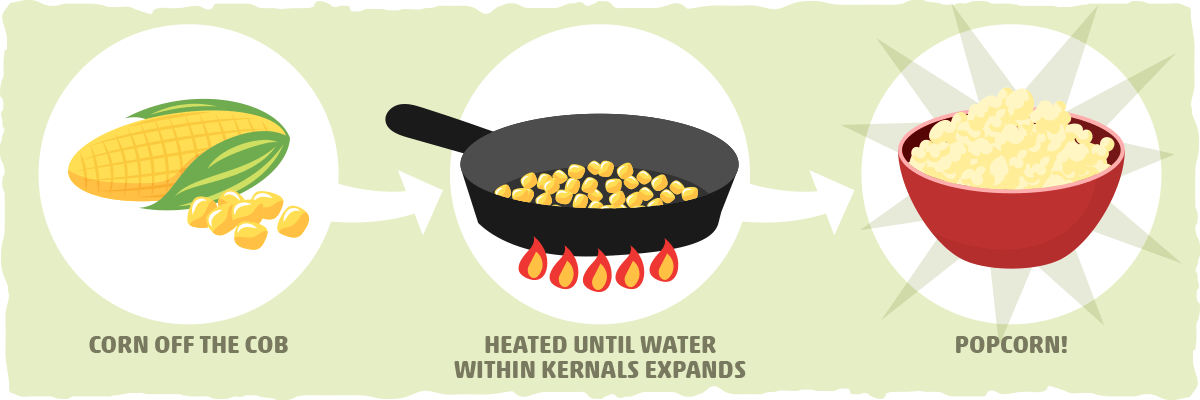
Popcorn kernels are simply dehydrated corn off the cob. They are then heated until the water that’s left inside of them expands and the kernels explode open to around 40x their pre-popped size.
This delicious snack hack has been enjoyed for thousands of years. In fact, the first evidence of popcorn consumption was found on the coast of Peru, dating back over 6,000 years ago.
Today, you’ll find hundreds of popcorn products ranging from stovetop to microwavable, pre-popped pre-packaged to pure kernels, and a plethora of sweet, salty, and/or savory flavors. With all these choices, the world of popcorn can be overwhelming, especially on a low-carb keto diet.
This is why it is best to keep it as simple as possible with 100% unpopped kernels that you’ll pop yourself and add your preferred keto-friendly ingredients to boost the flavor and fat content.
We must keep in mind, however, that even in its purest form, popcorn contains the same starches found in the fresh ear of corn. To fit popcorn into your low-carb or keto diet, it is crucial that consider the carb content in each cup.
Is Popcorn Low Carb and Keto? Nutrition and Carbs in Air-popped Popcorn
First, let’s examine the overall nutrition provided by air-popped popcorn (without any other added ingredients).
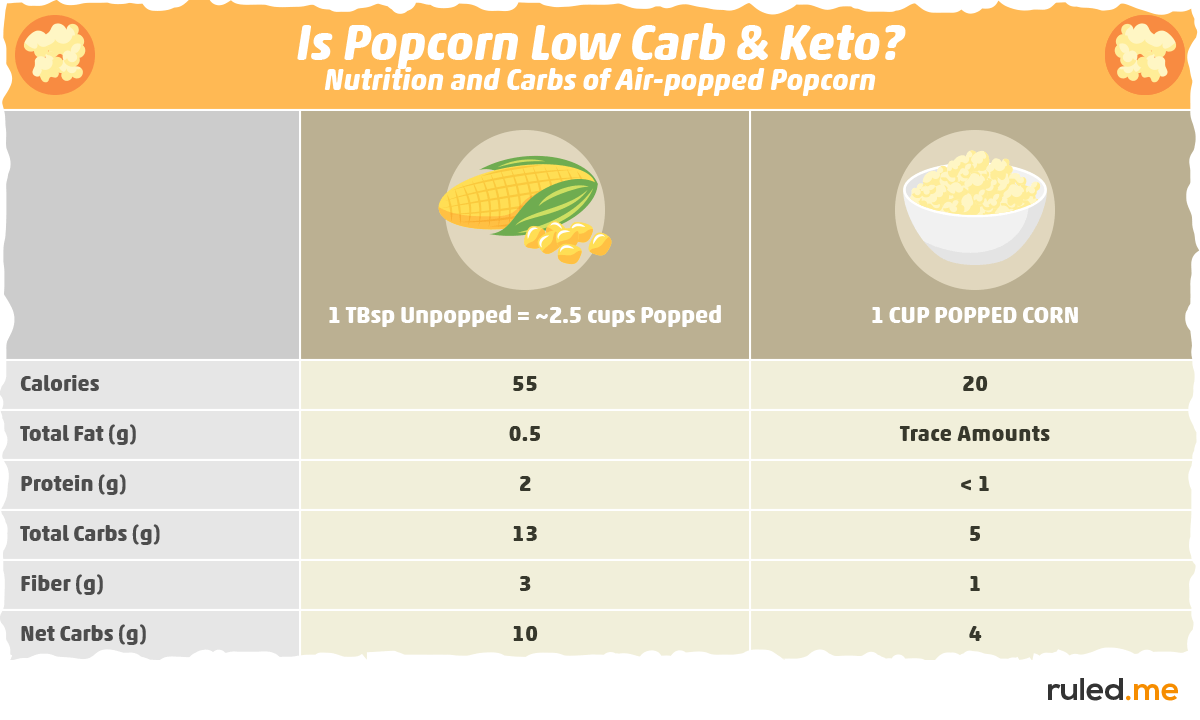
From a macronutrient ratio perspective, however, each cup of popcorn has 80% net carbs! This is far from keto-friendly, right? Furthermore, popcorn offers us a good source of vitamin B1 (thiamin), vitamin B3 (niacin), vitamin B6 (pyridoxine), antioxidants, and several key minerals.
Well, it depends. As long as you are mindful of the portion sizes and any additional ingredients, you can fit this high-carb food into your keto diet without disrupting ketosis.
Can You Eat Popcorn on Keto? Turning a Ketosis Disruptor into a Healthy Low Carb Snack
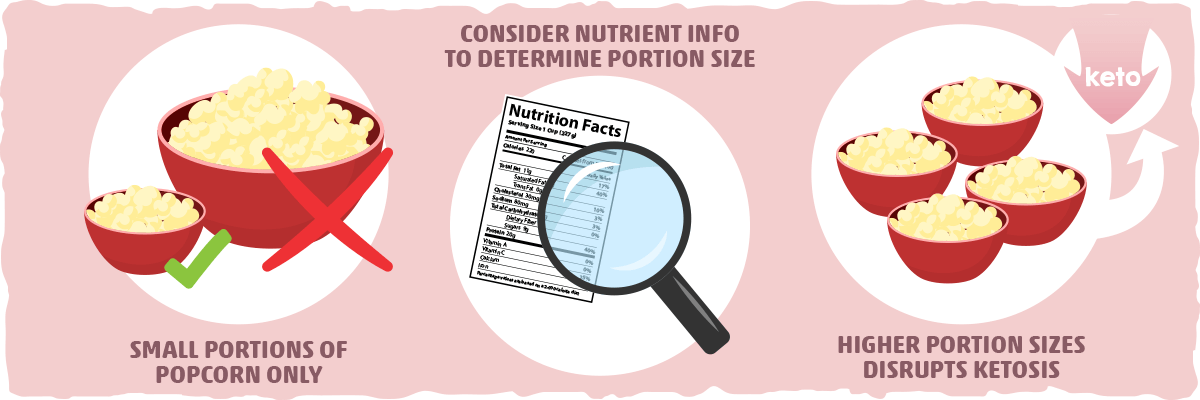
Though keto and low-carb dieting is much easier without the addition of high-carb foods, you can make an exception for small portions of popcorn.
By considering the nutrition info above (or the information on the popcorn label) and your daily net carb limit, you’ll be able to determine the proper portion size for your diet.
As an example, let’s say your daily net carb limit is 25 grams (which is a great starting point for most keto beginners). With this limit in mind, you can start planning your popcorn serving size. Two cups of popped popcorn would leave you with 17 g left from your other keto meals. As long as you limit your consumption of any other high-carb foods, this would be a reasonable serving for keto.
In contrast, as the portion size increases to 3 or 4 cups, you’ll find it difficult to fit it into your daily carb limit without displacing healthier keto-friendly options. This is when a healthy low-carb snack becomes a ketosis-disrupting food.
In general, it’s best to avoid foods like this, but if you absolutely can’t give it up, you’ll find some suggestions on how to fit popcorn into your keto diet.
How to Add Popcorn to Your Keto Diet Without Impairing Ketosis
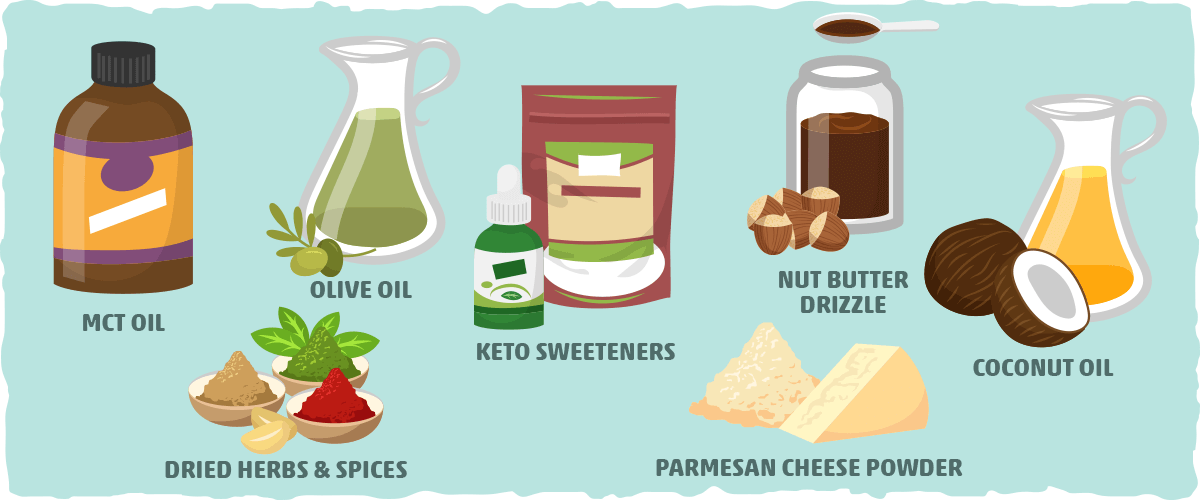
As with potato chips, popcorn is surprisingly easy to overeat when we aren’t mindful of our portions.
To help keep your portion sizes in check while feeling fully satisfied with each serving, consider adding keto fats (like butter) to your popcorn. The added fat and flavor will make each bite more fulfilling, so a cup or two is all you need to curb your carb cravings.
Other than butter, there are plenty of other keto-friendly popcorn toppings you can use to enhance the fat content and/or flavor:
- Olive oil
- Coconut oil
- MCT oil — This flavorless oil can help provide an extra ketone boost as well.
- Nut butter drizzle — Over low-to-medium heat, combine your favorite sugar-free nut butter with a keto-friendly sweetener. If it’s too thick, add a small amount of coconut oil, butter, or MCT oil for easier drizzling. Homemade Macadamia Nut Butter, Keto Nutella, and natural peanut butter are some of the best options for this keto popcorn hack.
- Keto sweeteners — Mix a keto-friendly sweetener with melted butter or oil and drizzle on top for a quick and easy keto kettle corn alternative.
- Dried herbs and spices — Turn your popcorn into a savory, flavorful snack by tossing it with some of your preferred herbs and spices.
- Parmesan cheese powder — Skip those cheese-flavored popcorn products in favor of some real cheese. However, before adding the parmesan, make sure to drizzle some butter or oil on top to help the powder stick to the popcorn. You can even mix in some garlic powder for a keto-friendly garlic parmesan popcorn flavor.
By using the high-fat options on the list (such as butter, oil, or nut butter), you can turn an 80% net carb food into a high-fat keto snack. In fact, just one tablespoon of butter or oil is all it takes to raise the fat content of 2 cups of popcorn above 70%.
That said, we must also consider the carb content of the remaining 30%. Occasionally, you’ll find that you simply can’t fit a cup or two of popcorn into your carb limit for the day.
Keto-friendly Popcorn Alternatives and Snacks
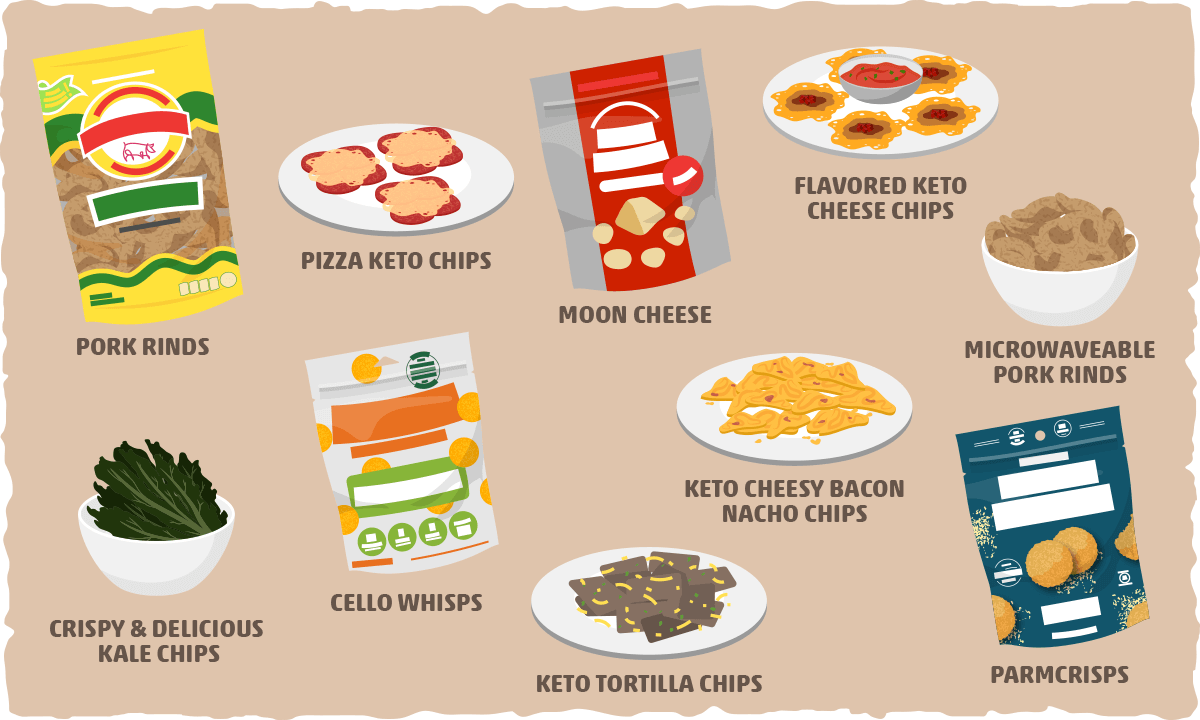
What do you do when even a measly handful of popcorn would take you above your daily carb limit? Opt for a very low carb popcorn alternative instead.
Below we’ve included the most popular keto-friendly options for when you need to keep the carbs as low as possible:
Store-bought Keto Popcorn Substitutes:
- Cello Whisps — Each bag of whisps is like cheese-flavored popcorn without the popcorn. These cheese crisps come in nine different flavors containing between 1 and 3 g of net carbs per ounce serving.
- Moon Cheese — Similar to Whisps, but with a popcorn-like shape and different flavors (including cheddar bacon and gouda). Each 1-oz. serving comes with 1 to 2 g of net carbs.
- ParmCrisps — These are made from 100% aged parmesan cheese with a wide variety of flavors as well.
- Microwaveable pork rinds — Skip the high-carb popcorn and grab some microwaveable pork rinds for your next movie night. With the extra crunch and flavor they provide, you may never crave popcorn again.
- Pork rinds — This humble keto snack will give you the saltiness and crispness you’d get from popcorn, but with zero carbs. To learn more about what pork rinds to buy and their surprising health benefits, check out our guide to eating pork rinds on keto.
Homemade Keto-friendly Popcorn Alternatives:
- Keto Tortilla Chips
- Keto Chips
- Pizza Chips with Pepperoni & Cheese
- Keto Cheesy Bacon Nacho Chips
- Crispy & Delicious Kale Chips
- Flavored Keto Cheese Chips
Would you like to see more low-carb snack options? Check out our comprehensive list of healthy snacks for keto.
The Bigger Picture: Low Carb Popcorn and Your Keto Weight Loss Results
Popcorn can be a healthy addition to your keto diet, but only when it’s eaten with your daily carb limit in mind.
You can even use popcorn as a way to add more fat, flavor, and nutrition to your day with the help of butter, high-quality oils, sugar-free nut butter, keto sweeteners, and seasonings.
That being said, there are plenty of low-carb popcorn alternatives that are much easier to fit into a keto diet. Pork rinds and cheese crisps, for example, have a much lower carb content than popcorn and are packed with high-quality fats and flavor.
However, if you are struggling to stay keto and get the results you want, then a popcorn substitute is unlikely to help. In this case, we must shift our focus to your overall meal plan and macronutrient needs.
To help you figure out what keto lifestyle changes to make, we’ve included several tools that’ll get you on track toward achieving your health and weight loss results:
- A Comprehensive Guide to the Ketogenic Diet — Keto made simple with a food list, recipes, tips, and tricks.
- Our Keto Calculator — The easiest way to estimate your daily macronutrient needs.
- Our Keto Meal Planning App — A personalized keto diet plan tailored to your goals and food preferences.